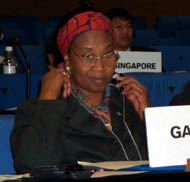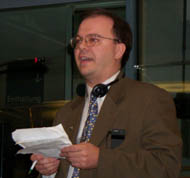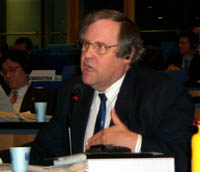| Delegates
considered two proposed financial mechanisms: the EU, CANADA and the
US submissions for existing mechanisms; and the G-77/CHINA submission
for establishing a new mechanism. Chair Buccini called for clarification
on the submissions' intent. |
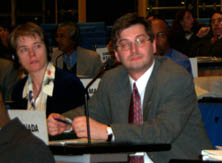 |
|
|
 CANADA (above and left), recognizing additional resources
will be required, supported using existing mechanisms to build upon
existing POPs activities and to provide faster access to funds. He
noted CAN provisions for, inter alia: an inventory of technical
assistance sources and requests; advice on requirements for accessing
sources; private sector involvement; and identifying and reporting
requests for assistance not being met to the COP.
CANADA (above and left), recognizing additional resources
will be required, supported using existing mechanisms to build upon
existing POPs activities and to provide faster access to funds. He
noted CAN provisions for, inter alia: an inventory of technical
assistance sources and requests; advice on requirements for accessing
sources; private sector involvement; and identifying and reporting
requests for assistance not being met to the COP. |
 The EU noted its support for strengthening existing mechanisms,
and said selecting the GEF is the best way to secure implementation.
Noting some countries' concerns with the GEF, he drew attention to
a GEF paper that details what would be required to establish an operational
POPs programme within the GEF.
The EU noted its support for strengthening existing mechanisms,
and said selecting the GEF is the best way to secure implementation.
Noting some countries' concerns with the GEF, he drew attention to
a GEF paper that details what would be required to establish an operational
POPs programme within the GEF. |
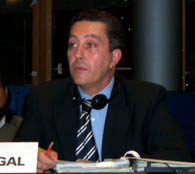 |
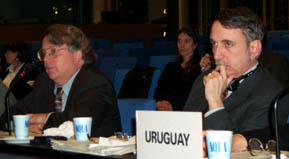 |
 The US supported a financial mechanism comprised of the CAN, serving
as a broker, and existing entities. He said the COP would provide
guidance to the mechanism and, inter alia, identify areas where requests
for assistance are not being met and consider policies to strengthen
existing funds. He said using existing entities will allow for a synergistic
approach.
The US supported a financial mechanism comprised of the CAN, serving
as a broker, and existing entities. He said the COP would provide
guidance to the mechanism and, inter alia, identify areas where requests
for assistance are not being met and consider policies to strengthen
existing funds. He said using existing entities will allow for a synergistic
approach. |
|
NIGERIA, BRAZIL,
INDIA and CHINA spoke on behalf of the G-77/CHINA, and underscored
the importance of establishing an independent multilateral fund.
NIGERIA challenged
the contention that establishing a new mechanism would be more costly
and time consuming than making necessary modifications to restructure
the GEF.
|
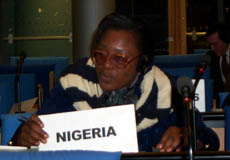 |
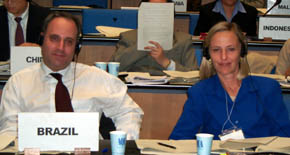 |
BRAZIL, stressing
that developing countries will not adopt an instrument without provision
of assistance, requested the EU to elaborate on how it intends to
provide funds.
 RealAudio of Nigeria and Brazil's statements
RealAudio of Nigeria and Brazil's statements
|
|
Noting the GEF takes its own decisions and decides how funds will
be spent, CHINA asked who will guarantee that the GEF will direct
sufficient funds to support the POPs convention. |
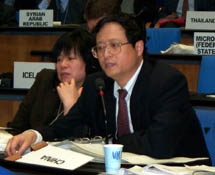 |
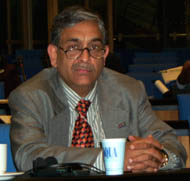 |
 INDIA (left) emphasized that developing countries should
not be kept in the dark about what type of assistance will be available.
He said the experience of developing countries with the GEF has not
been good, and noted frustrations associated with multiple funding
sources, including meeting differing criteria and submitting multiple
applications.
INDIA (left) emphasized that developing countries should
not be kept in the dark about what type of assistance will be available.
He said the experience of developing countries with the GEF has not
been good, and noted frustrations associated with multiple funding
sources, including meeting differing criteria and submitting multiple
applications. |
| The
CZECH REPUBLIC, on behalf of the Central and Eastern European region,
supported using the GEF, rejected assertions that the GEF is inefficient
and slow, and supported the CAN. CAMEROON questioned the legality
of determining the effecting institution before completing negotiations.
|
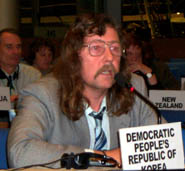 |


